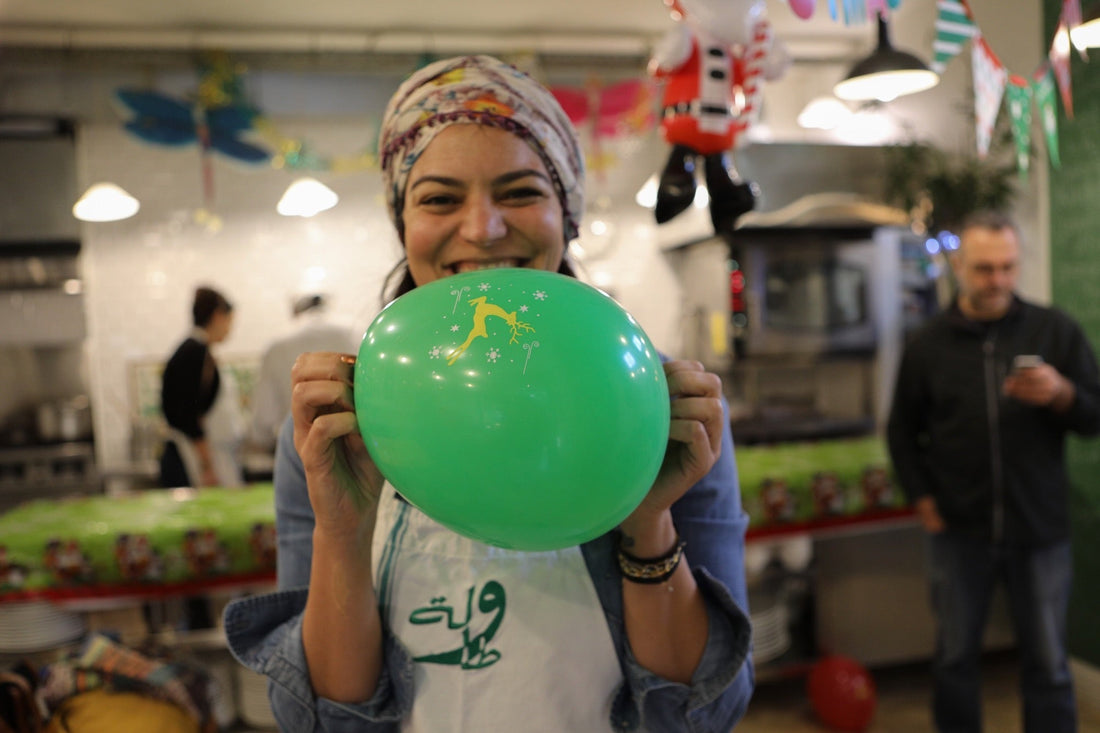
Share
Turning Struggles into Inspirations
Navigating Life's Hurdles, Finding Joy in Everyday Moments, and Savoring the Delights of Ghannouj's Table
JAN 08, 2024
I read a caption on a post on Instagram, a heartfelt message from a friend. This friend spoke of returning to work after nearly three months of living in a haze, surrounded by the tumultuous events in Gaza. What struck me most was the realisation that returning to doing what he loved became an act of resistance—a stand against all wrong with us as humans and the world we've created.
It resonated deeply with me because, in our ways, we all navigate through challenges and uncertainties. We might not have the same struggles but share the common thread of finding strength within ourselves. The acknowledgement and acceptance of pain are powerful, but what's even more inspiring is the ability to use that pain as fuel for doing good and working on the things we love.
In this fifth edition of The Ghannouj Gazette, I delve into the things I love to face life's challenges. I will share my thoughts and opinions on what has captured my attention in reading, watching, and listening. It's a journey through the lenses of inspiration, seeking the stories and ideas that light a spark within us.
Furthermore, join me at Ghannouj's Table, where I've embarked on a culinary exploration of Vegan January, or as some affectionately call it, Vaganuary. Together, we'll venture into the rich and abundant plant-based repertoire that our Lebanese cuisine offers. It's a celebration of flavours, traditions, and the ever-expanding possibilities of embracing a plant-based lifestyle.
Ghannouj's Table, launched last year, is more than just a supper club; it's a heartfelt homage to the remarkable women who paved the way in my life. These incredible women were great cooks and embodied love and generosity, always making space at their table for a hungry soul. Rooted in the warmth of these memories, Ghannouj's Table emerged as a celebration of Lebanese culture, showcasing our cuisine's rich and diverse tapestry.
Focusing on my Lebanese roots allows us to break free from stereotypes and clichés, providing an authentic taste of my heritage. The table embraces the essence of familial gatherings with its simple setting for ten. Comprising seven shared plates, the monthly changing menu captures the bountifulness of our culinary traditions. Stepping into Ghannouj's Table feels like a Sunday lunch at your grandmother's—warm, cosy, and filled with the comforting aroma of home-cooked delights. It's an intimate invitation into our lives, where conversations flow as naturally as the flavours on the plates, fostering a sense of connection and community beyond the boundaries of the dining experience.
If you would like to reserve a seat at my table, please follow this link to make a booking.
So, let's immerse ourselves in the stories, flavours, and ideas that uplift our spirits and fuel our passions. Amid challenges, let this edition of The Ghannouj Gazette remind us that we can turn pain into purpose and find joy in the things we love.

"The Extraordinary Attorney Woo": Navigating Controversy and Compassion
"The Extraordinary Attorney Woo," a South Korean series on Netflix, has left an indelible mark as one of the most-watched non-English shows in 2022. Centred around a newly minted autistic lawyer, portrayed by the talented Park Eun-bin, the series delves into the intricate layers of autism and its intersection with the legal world.
Park Eun-bin's performance as Young-woo has garnered high acclaim in South Korea, not only for her compelling acting but also for her thoughtful writing. The actress's initial reluctance to accept the role highlights her moral responsibility to portray Woo in a sensitive and not hurtful manner.
The series bravely addresses the question of how autistic individuals are perceived and integrated into South Korean society, where discussions about disability are often overshadowed by shame. It navigates this delicate terrain by familiarising the audience with the inner workings of autistic thought, avoiding the trap of pathologising autism. Rather than relying on stereotypes, the show portrays the unique mannerisms, preoccupations, and obsessive thought processes associated with autism.
While "The Extraordinary Attorney Woo" has been commended for its authentic portrayal of autism, critics argue that the producers missed an opportunity to involve autistic individuals in the production process. Despite this, the show stands out for articulating the social aspects of disability, offering viewers a glimpse into the challenges and triumphs of navigating a neurotypical-centric society.
One of the series' strengths lies in its ability to present autism from the inside out, dispelling common misconceptions and offering a nuanced perspective on the complexities of the condition. "The Extraordinary Attorney Woo" goes beyond mere entertainment; it becomes a lens through which viewers can empathise with and understand the unique experiences of autistic individuals. While controversy may surround its production choices, the series contributes to fostering discussions about inclusivity, representation, and the need for a more authentic portrayal of autism in the media.
You need a Netflix account, Extraordinary Attorney Woo, to watch the series.

The Professor: Unraveling Art, Crime, and Charisma in a Riveting Podcast Saga
Escaping the clutches of the sensational scandals chronicled in the British Scandles podcast proved challenging. Finding something as enthralling in the vast seas of audio stories seemed like an elusive quest—until I stumbled upon "The Professor." A podcast that initially seemed like a refuge from the ongoing British turmoil turned out to be a thrilling journey into the shadowy world of art smuggling and the intricate ties between crime, politics, and the art market.
"The Professor" unravels the gripping tale of William Veres, an Anglo-Hungarian art dealer whose moniker echoes his expertise in historical coins. Accused of orchestrating a pan-European art smuggling ring, Veres faced an array of serious charges—money laundering, forgery, wire fraud, and conspiracy, all of which could potentially lead to a 20-year jail term. The podcast skillfully recounts the twist in the tale when Veres struck an unexpected deal with Italy's anti-mafia police, offering his expertise to locate Caravaggio's stolen masterpiece, "Nativity with St Francis and St Lawrence."
Host Simon Willis masterfully narrates the complex web that binds the Sicilian mafia, the art market, and high-ranking politicians like former Italian Prime Minister Silvio Berlusconi. The story is a riveting exploration of intrigue and deception, with the stolen painting's $20 million value adding a layer of high-stakes drama.
While "The Professor" might raise ethical questions surrounding the creation of a podcast centred on a man accused but not convicted of art smuggling, it takes an interesting approach. Willis, the podcast's creator, does not directly address these ethical concerns but focuses on weaving a captivating narrative. It is clear that he was charmed by Veres.
As the episodes unfold, "The Professor" keeps the audience on the edge of their seats, balancing the thrill of a crime drama with the nuanced exploration of the art world's darker corners. It's a tale of intrigue that transcends the boundaries of conventional podcasting, creating an immersive experience that lingers long after the final episode. In the realm of true crime podcasts, "The Professor" stands out as a masterfully crafted, thought-provoking, and thoroughly engrossing journey into the labyrinth of art, crime, and charisma.
If you want to listen to the podcast, click on this link: The Professor.
The Ghannouj Gazette is a reader-supported publication. To receive new posts and support my work, consider becoming a free or paid subscriber.
